Seven Things You Need To Know About Tires
We often see customers who are a little overwhelmed by the tire buying process. There are so many types of tires for different vehicles and different driving styles, all at different price points. Here are a few things every driver needs to know about tires:
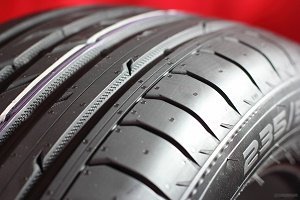
· A tire is constructed from the inside out, starting at the inner liner. There are 20 to 25 different components in every tire; fabric belts are wrapped around the inner liner, with steel belts, more fabric belts and other materials layered between the tread surface and the inner liner. These layers provide strength, noise suppression and ride quality.
· Newer low-profile tires are popular with many drivers, if only for aesthetic/style reasons. It’s important to know low-profi ...[more]
Benefits You Didn’t Know About Oil Changes
Automotive technology has come a long way since the mid-20th century, and so has motor oil. A 1940s-era car didn’t feature an oil pump or oil filter. Instead, they relied on dippers on the crankshaft’s counterweights, which would then sling oil to coat crucial moving parts. Motor oils in those days weren’t designed with detergents and other additives to help keep the engine clean; even with frequent oil change intervals, many cars would be in need of an engine overhaul by the time they reached 80,000 miles.
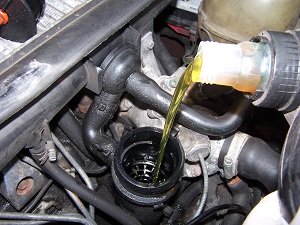
Today’s motor oil formulations incorporate additives to suspend contaminants in the oil so they can easily be trapped by the oil filter. Here are a few other facts about motor oil you may not have known:
...[more]
What Makes All-Season Tires So Great?
So your closet has a pair of flip-flops for the summer, a pair of heavy boots for the winter, and a comfortable pair of sneakers for most of the rest of the year. If you live in a climate that doesn’t have harsh winters, you might just be able to wear those sneakers year-round...and all-season tires are the equivalent of your comfortable sneakers.
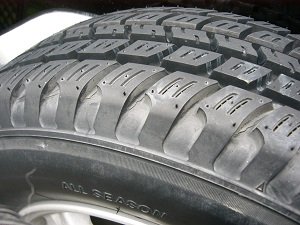
So what makes all-season tires so special?
Winter tires are excellent for severe conditions like heavy snow and even ice. They feature specially-designed tread patterns and “sipes”, hundreds of tiny slits which offer biting edges for traction in snow. This means shorter stopping distances, better handling and better control in winter weather. Winter tires are not d
esigned for temperatures above 40 degrees Fahrenheit. The dow ...[more]
Six Hot Tips on Cool Air Conditioning
.jpg) Summer is here, and it’s time to start thinking about your car’s AC system! Nobody likes driving around in a hot, stuffy car, and a car with an AC system which only works marginally is somehow almost even worse than one which doesn’t work at all. Let’s go through a few tips which can help you keep your ride a little more comfortable this summer…
Summer is here, and it’s time to start thinking about your car’s AC system! Nobody likes driving around in a hot, stuffy car, and a car with an AC system which only works marginally is somehow almost even worse than one which doesn’t work at all. Let’s go through a few tips which can help you keep your ride a little more comfortable this summer…
Remember a cars AC system is really a heat exchanger which moves hot air out of your vehicle, then replaces it with cold air. One thing you can do to help improve its efficiency is to leave your windows down an inch or two (if possible) when you park the car, helping to prevent excess heat buildup. When you start the car and begin to drive off, lower all the windows for the first minute or two to help move hot air out of the car more quickly, giving the AC system a chanc ...[more]
Get Ready for Summer Road Trips with New Tires
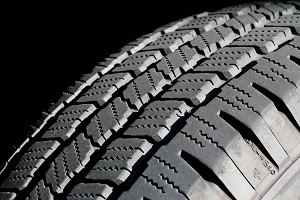
4 Budget Friendly Ways to Improve Mom’s Ride
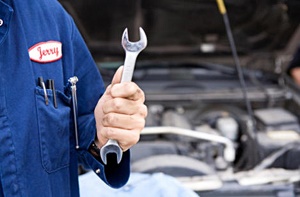
9 Tips for your Spring Vehicle Checkup
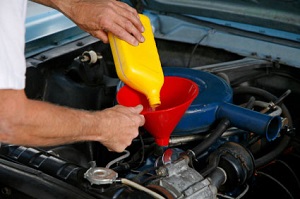 The temperatures are inching upward, the days are getting longer and the first buds are starting to appear on the trees. Spring is on its way, and soon it’s going to be time to do a little preventive maintenance on your ride. No need to dread it -- it’s all pretty routine stuff!
The temperatures are inching upward, the days are getting longer and the first buds are starting to appear on the trees. Spring is on its way, and soon it’s going to be time to do a little preventive maintenance on your ride. No need to dread it -- it’s all pretty routine stuff!
- Air filter - If you haven’t changed your air filter since last year (or can’t remember when you changed it at all), it might be time. It’s an easy and cheap fix, and it pays off in your vehicle’s performance and fuel economy.
- Cabin filter - Older vehicles often don’t have a cabin filter, but it can make a lot of difference in how pleasant your vehicle is to drive. Stale, smelly air? Change it!
- Wipers -- Get a good look at them. Are they showing signs ...[more]
Why Schedule Regular Oil Changes For Your Vehicle?
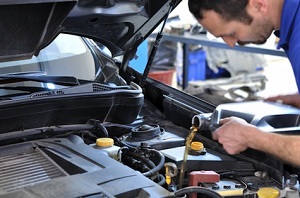 Many vehicle owners do not take the time to schedule regular oil changes. Regular oil changes are vital to the life of your engine and can extend its performance for years. This is one of the most important and inexpensive things you can do to keep engine protected. Most manufacturers recommend changing your oil every 3,000-6,000 miles, depending on your vehicle use and the type of oil you are using.
Many vehicle owners do not take the time to schedule regular oil changes. Regular oil changes are vital to the life of your engine and can extend its performance for years. This is one of the most important and inexpensive things you can do to keep engine protected. Most manufacturers recommend changing your oil every 3,000-6,000 miles, depending on your vehicle use and the type of oil you are using. - Lubricate engine to reduce wear and friction
- Reduce engine temperatures
- Maintaining proper engine function
Don’t Let Tire Problems Put the Brakes on Your Valentine’s Date
 Don’t let tire problems get in the way this Valentine’s day. How is your tire pressure? Do my tires need to be rotated? Is it time for an alignment? Do I need new tires? While these questions can seem daunting, with the help of tire professionals and various routine self-checks, any driver can maintain proper tire care and not miss that big date this Valentine’s Day. From tire rotations to air pressure, learning what signals might indicate tire replacement or repair is important for every vehicle owner.
Don’t let tire problems get in the way this Valentine’s day. How is your tire pressure? Do my tires need to be rotated? Is it time for an alignment? Do I need new tires? While these questions can seem daunting, with the help of tire professionals and various routine self-checks, any driver can maintain proper tire care and not miss that big date this Valentine’s Day. From tire rotations to air pressure, learning what signals might indicate tire replacement or repair is important for every vehicle owner. | << Previous | 12 |
